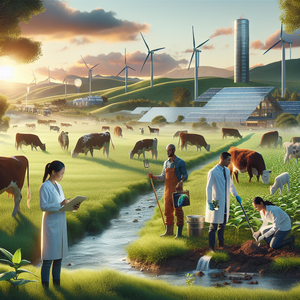
Sustainable Beef Production Careers: Building a Future of Innovation and Environmental Stewardship
As the global population grows and concerns about climate change intensify, the need for sustainable food systems has never been more urgent. Among the sectors facing this challenge head-on is beef production, which has traditionally been criticized for its environmental impact. However, a wave of innovation is transforming how beef is produced, prioritizing practices that restore ecosystems, reduce greenhouse gas emissions, and support economic and social well-being.
Job Summaries:
Regenerative Ranch Manager:
- Regenerative ranch managers adopt practices like rotational grazing and native grass restoration to enhance soil quality, biodiversity, and water retention while reducing greenhouse gas emissions.
- They monitor carbon levels in the soil and develop grazing schedules that promote ecological balance.
- Qualifications include a degree in agricultural science, environmental studies, or animal science, along with practical experience.
- These practices can sequester up to 3 tons of carbon per acre annually.
Sustainable Agriculture Consultant:
- Sustainable agriculture consultants work with ranchers to improve environmental sustainability and profitability.
- They conduct carbon audits, recommend methane-reducing feed alternatives, and design custom grazing systems.
- A background in environmental science, agricultural engineering, or sustainability is essential.
- Consultants help ranchers meet certification standards, opening doors to premium markets.
Livestock Nutritionist:
- Livestock nutritionists design diet plans to improve cattle health while reducing environmental impacts.
- They incorporate innovative feed solutions, such as seaweed-based supplements, to reduce methane emissions.
- A degree in animal nutrition or veterinary science is required.
- Seaweed supplements can reduce methane emissions by up to 80%.
Soil Health Specialist:
- Soil health specialists restore degraded grazing lands by improving soil structure, organic matter content, and microbial activity.
- They use soil testing and recommend practices like cover cropping and compost application.
- A degree in soil science, agronomy, or ecology is typically required.
- Healthy soils can store 2-3 times more carbon than degraded ones.
Grazing Systems Analyst:
- Grazing systems analysts use technologies like GIS mapping and predictive modeling to optimize pasture management.
- They help ranchers align practices with long-term sustainability goals.
- Proficiency in data analysis, agricultural systems, and environmental science is required.
- Improved grazing strategies can increase pasture efficiency by up to 20%.
Carbon Credit Program Coordinator:
- Carbon credit program coordinators connect ranchers with opportunities to monetize sustainable practices.
- They ensure accurate reporting and compliance for carbon-sequestering techniques.
- A degree in environmental policy, business, or agriculture is needed.
- Ranchers can earn up to $40 per acre annually through carbon offset programs.
Silvopasture Manager:
- Silvopasture managers integrate trees and shrubs into grazing systems to benefit livestock and the environment.
- They improve carbon storage, provide shade, and enhance biodiversity.
- A background in forestry, agroecology, or environmental science is essential.
- Silvopastural systems can sequester 4-6 tons of CO2 per acre annually.
Agricultural Economist:
- Agricultural economists assess the financial implications of sustainable practices, helping ranchers transition to regenerative methods.
- They analyze costs, benefits, and market trends.
- A degree in economics or agricultural business is required.
- Economists empower ranchers to adopt environmentally and financially sustainable practices.
Climate-Smart Agriculture Specialist:
- Climate-smart agriculture specialists design and implement climate-friendly solutions like renewable energy systems and water-efficient technologies.
- They develop strategies to minimize waste and optimize resources.
- A degree in environmental science, agricultural engineering, or climate studies is needed.
- Proper implementation can reduce water usage by up to 30% and lower energy costs by 20%.
Regenerative Agriculture Educator:
- Regenerative agriculture educators spread knowledge about sustainable practices by organizing workshops.
- Developing training materials.
- Leading field demonstrations.
- A degree in agricultural education, environmental science, or a related field is required.
- Educators accelerate the adoption of regenerative practices, amplifying their benefits.
Sustainable beef production careers offer a unique opportunity to address some of the world’s most pressing challenges, from climate change to food security. Whether you’re restoring degraded soils, designing sustainable grazing systems, or educating ranchers, each role contributes to a more resilient and regenerative food system. By joining this transformative field, you can help shape a future where agriculture works in harmony with the planet.
Explore More Jobs
